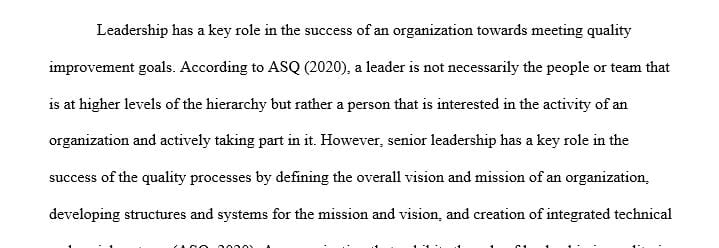Research and summarize senior management’s role in successful quality improvement programs.
Week 2: The Role of Leadership (300–400 words)
Research and summarize senior management’s role in successful quality improvement programs. Be sure to use real, researched examples to demonstrate your points. The Baldrige Award site list of recipients could be a good resource for examples.
In general, identify senior management’s specific role in these large-scale strategic quality programs? Cheerleader? Role model? Decision maker? Resource provider? What else?
Why must firms adopt the identified roles? What is the risk of not using the roles?
Indicate how senior and middle management should derive the metrics to use to monitor and communicate performance?
With each week, you should include a minimum of 3 new cited references. As such, the references should be varied and different with each section addition. You can reuse references, but repeat references do not count toward the minimum 3 new cited references.
Here is my 1st individual project I did:
Quality management didn’t occur till the early twentieth century. In the eighteenth and nineteenth century, quality management did not occur, and management used handling business without putting much attention on quality. In 1913, JC Penny introduced the relevance of total quality by discussing the seriousness of customer fulfillment, importance, righteousness and satisfying performance. Subsequently, scholars such as Fredrick Taylor concentrated on revamping the industrial effectiveness, and therefore, earning the recognition of being called father of scientific management. Some of Frederick’s styles detailed on quality management, which involves applying better quality practices. Ford Henry later brought the practices and methods of quality management put into practice. Edward Deming with the assistance of Shewhart and Juran created the principles of quality management with the intent of providing a competitive advantage to companies. Following the advancement of quality management, have defined the term quality in different perspectives. Nevertheless, in spite of the dissimilarity in their meaning, scholar concentrated on the quality establishing on features including product greatness, customer fulfillment, the adequacy of purpose, an adhering to demands. According to (Kuei & Lu, 2013), “Therefore, the name quality can be explained in simple words as the process of adding value to customers, meeting their demands extremely surpassing their expectations, and can only be achieved through organization coordination.” The demand for quality in the present year was rested on the escalating of customer desire for quality servicing products. Therefore, quality management involves concentrating on customers’ happiness, understanding their wants, and seeking to satisfy these wants to get further ahead to a competitive edge.
In the process of enhancing quality inside the companies, senior management is endorsing practices, including the Deming Cycle, Six Sigma, and quality award criteria. The Deming Cycle points at enhancing quality through a continual growth, critical thinking, developing the human resource, and overseeing daily management for the entire organizational employees. The Six Sigma is recruited by the top management to terminate any inadequacy utilizing the DMAIC plan of action. Similarly, the award criteria such as Malcolm Baldrige Award aim at recognizing organizational performance by focusing on leadership, customer focus, speed of delivery amongst others. My quality control manual is for my current position of being a Personal Assistant and working under the DORS (Department of Rehabilitation Services).
According to (Todorut, Cirnu, & Niculescu, 2009), “Six-sigma model is an approach that aims at implementing and improving quality through the reduction of defects. Introduced by Bill Smith in 1986, the method focuses on improving quality by minimizing defects as well as using the DMAIC method to solve quality problems”. Six-sigma model has shown to have an ongoing successful outcome if well effective. In addition to, six-sigma model style raises customer value by improving workers’ job contentment, teamwork, and becomes better with communication. However, in spite of upsides of six-sigma style, the plan of action needs the entire organization involvement. Furthermore, the procedure is complexed because it requires a complete statistical examination and gathering.
Reference List
blog.keenessays.com/2014/11/prior-advent-total-quality-management-concept-senior-managements-typical-approach-toward-quality/
Kuei, C., & Lu, M. H. (2013). Integrating quality management principles into sustainability management. Total Quality Management & Business Excellence, 24(1/2), 62-78. doi:10.1080/14783363.2012.669536
Todoruţ, A. V., Cîrnu, D., & Niculescu, G. (2009). The Relation among Six Sigma and other Managerial Techniques of Improving the Performances of the Organizations. Annals of the University of Petrosani Economics, 9(4), 289-296.
.Here is the professor response:
Strengths: For the introduction, you were asked to provide a history of quality management, why it is needed, list and discuss 2-3 specific directions that companies are adopting in terms of strategic quality management and explain the evolution of and the pros and cons of Deming and Six Sigma. Good work discussing management activities and functions specific to quality management and you give a good overview of Six Sigma. Also, great work supporting your manual with research.
Opportunities for improvement: Keep in mind that your quality control manual is for the logistics and SCM departments of your selected organization. What are 2-3 specific directions that companies are adopting in terms of strategic quality management? Here, you can focus on your selected organization.
Answer preview to research and summarize senior management’s role in successful quality improvement programs.
APA
618 words



